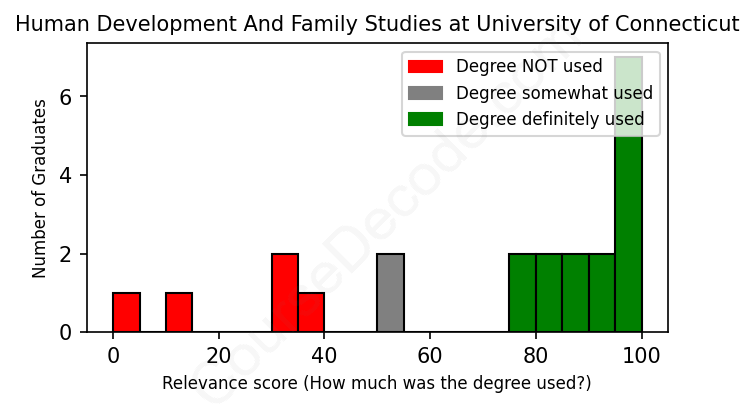
First, some facts. Of the Human Development And Family Studies graduates from University of Connecticut we've analyzed , here's how many have used (or NOT used) their degree in their career:

These are estimates based on AI analysis of 22 LinkedIn profiles (see below).
The verdict? Slightly above average. Overall, with an average relevance score of 72%, Human Development And Family Studies graduates from University of Connecticut have a slightly higher likelihood (+5%) of finding work in this field compared to the average graduate across all fields:
And for comparison, here's the chart for all profiles we've looked at across all degrees.
Also, after graduating, 59% of these graduates have pursued further education other than another Bachelor's degree (such as a Masters degree or other), compared to the average across all profiles of 35%. This suggests you may need more than just a Bachelors degree to be competitive as a Human Development And Family Studies graduate.
See the details:
|
Relevance score: 79% We think this person has gone into a career highly relevant to their degree. We think this person has gone into a career highly relevant to their degree.
DEGREE INFOGraduated in 2012 from University of Connecticut with a Bachelor's degree in Human Development And Family Studies. No other secondary education since. JOB HISTORY SINCE GRADUATIONSubstitute Teacher Mansfield Discovery Depot Feb 2012 - Jul 2012 Office Assistant  Next Plumbing Supply Jan 2015 - Jun 2015 College Program Intern  Walt Disney World Aug 2012 - May 2013 Merchandise Associate  Walt Disney World May 2013 - Oct 2013 FastPass+ Trainer/Coordinator  Walt Disney World Oct 2013 - May 2015 Front Desk Staff  Walt Disney World May 2015 - Oct 2016 Merchandise Coordinator  Walt Disney World Oct 2016 - Apr 2018 Coordinator of Training  Walt Disney World Apr 2018 - Present ABOUTNo information provided. |
The top 10 most common jobs done by the graduates we've analyzed (ranked most common to least) are:
When looking at the types of jobs held by people with a Human Development and Family Studies degree from the University of Connecticut, it’s clear that many pursue careers in fields that directly relate to human development and family dynamics, particularly in the areas of mental health and education. For instance, roles like Mental Health Worker, Case Manager, Program Coordinator, Pre-K Teacher, and various clinical positions showcase a strong connection to their academic background. These positions typically leverage skills in understanding human behavior, supporting families, and applying developmental theories—essentially what they studied.
However, not all jobs taken by graduates are closely tied to their major. Several individuals have found themselves in roles like customer service representatives, administrative assistants, or positions within unrelated fields such as marketing and hospitality. While some of these roles might utilize interpersonal skills learned from their studies, they don’t fully tap into the specific knowledge from Human Development and Family Studies. So, in general, while many UConn graduates are successfully utilizing their degree in relevant fields, there’s also a noticeable chunk that has taken paths not directly related to their studies. This variety indicates that the degree offers valuable skills that can translate into a broader job market but also highlights the importance of aligning career choices with academic training for the best utilization of their education.
Here is a visual representation of the most common words in job titles for Human Development And Family Studies graduates (this is across all Human Development And Family Studies graduates we've analyzed, not just those who went to University of Connecticut):

The graduates from the University of Connecticut with a degree in Human Development and Family Studies have taken a variety of paths after graduation, but there's a clear trend towards roles centered around helping and supporting others, particularly in mental health and educational settings. For many, their first jobs tend to be in direct service roles like mental health workers, case managers, or educators. Over the years, they tend to advance into more specialized positions, such as therapists, program coordinators, or even administrative roles that focus on family and community services. It's nice to see that a good number of these grads are holding positions that are relevant to their field of study, like therapists and educators, showcasing a strong alignment with their degree's focus on human development and social support systems.
However, not every graduate sticks to that trajectory. Some have veered off into unrelated fields, such as marketing or even hospitality management, particularly in the earlier years post-graduation. This indicates that while Human Development and Family Studies does provide a solid foundation for meaningful work, some graduates might not find immediate opportunities that directly relate to their major. But after a good five to ten years, many seem to find their footing back in jobs that align with their passion for supporting families and communities, suggesting that a degree in this field can provide both versatility and a fulfilling career path over time. Ultimately, the degree tends to open doors for those committed to making a difference in people's lives, demonstrating the lasting impact of their education at UConn.
Honestly, a Bachelor’s degree in Human Development and Family Studies at UConn is generally considered to be on the more manageable side compared to some other majors, especially the more math or science-heavy ones. It's definitely a lot of reading, writing, and understanding theories about how people grow and interact with their families and communities, which might come more naturally to some students. But hey, like any degree, it’s not a walk in the park — you'll still have to put in the effort, attend lectures, participate in discussions, and complete assignments. So, if you have a genuine interest in understanding people and their relationships, and you stay organized, you’ll probably find it to be a pretty rewarding experience!
Most commonly, in the LinkedIn profiles we've looked at, it takes people 4 years to finish a Bachelor degree in Human Development And Family Studies.
Looking at the job histories of these UConn grads in Human Development and Family Studies, it seems like their earnings might be a mixed bag. Many of them have started in service-oriented roles, like case managers or educators, which usually don’t pay super well at entry-level. Over time, some have moved into roles with better pay, like project manager or clinical therapist, but others seem to be stuck in lower-paying positions. Although there are a few who have potentially landed decently paying jobs or are on upward trajectories, it’s clear that not all have hit the financial jackpot with their degrees. In short, while some might be doing okay, many are likely earning more on the modest side.
Here is a visual representation of the most common words seen in the "about" section of LinkedIn profiles who have a Bachelor degree in Human Development And Family Studies (this is across all Human Development And Family Studies graduates we've analyzed, not just those who went to University of Connecticut). This may or may not be useful:

Here are all colleges offering a Bachelor degree in Human Development And Family Studies (ordered by the average relevance score of their Human Development And Family Studies graduates, best to worst) where we have analyzed at least 10 of their graduates:
| College | Score | Count |
|---|---|---|
 Oklahoma State University Oklahoma State University
|
91 | 10 |
 University of Wisconsin-Madison University of Wisconsin-Madison
|
84 | 15 |
 University of Wisconsin-Stout University of Wisconsin-Stout
|
83 | 22 |
 The University of Texas at Austin The University of Texas at Austin
|
81 | 14 |
 Virginia Tech Virginia Tech
|
80 | 12 |
 The Ohio State University The Ohio State University
|
77 | 12 |
 Penn State University Penn State University
|
76 | 34 |
 University of California, Davis University of California, Davis
|
76 | 18 |
 Kansas State University Kansas State University
|
75 | 17 |
 University of North Texas University of North Texas
|
74 | 12 |
 University of Illinois at Urbana-Champaign University of Illinois at Urbana-Champaign
|
74 | 12 |
 Brigham Young University Brigham Young University
|
73 | 28 |
 University of Connecticut University of Connecticut
|
72 | 22 |
 Michigan State University Michigan State University
|
71 | 18 |
 Texas Tech University Texas Tech University
|
70 | 26 |
 Colorado State University Colorado State University
|
69 | 41 |
 Bowling Green State University Bowling Green State University
|
69 | 18 |
 University of Rhode Island University of Rhode Island
|
69 | 14 |
 Oregon State University Oregon State University
|
68 | 28 |
 Washington State University Washington State University
|
67 | 16 |
 University of Arizona University of Arizona
|
62 | 13 |
 The University of Alabama The University of Alabama
|
62 | 10 |
 Arizona State University Arizona State University
|
61 | 29 |
 The University of Georgia The University of Georgia
|
61 | 17 |
 University of North Carolina at Greensboro University of North Carolina at Greensboro
|
58 | 14 |
 California State University San Marcos California State University San Marcos
|
49 | 12 |